Faye Fite's Blog, page 28
January 1, 2016
10 Reasons Why Writers Aren't the Weird Ones
Happy new year folks! Hopefully you accomplished many of your 2015 writing goals. If not, don't worry. That's what 2016 is for. Pretty neat, right?
To kick off the new year, I wanted to write a post about something that's been bothering me for a while: The idea that writers are just plain weird (and not in a good way). I mean, I understand that writers are a bit different, and I'm proud to wear the "weird writer" badge. But I'm always hearing derogatory remarks about the oddness of writers and readers. For example:
"Oh, don't mind her. She's a writer, so she gets odd ideas about things."
"Yeah, a lot of writers are crazy, so you gotta be careful to make sure you don't turn out like them."
"He's just a bit off. He spends too much time writing."
Sound familiar? Probably. We see it depicted in books and movies: the reclusive creative, the author struggling with alcoholism, the person who spends so much time writing that life passes them by.
And I've always found it hilarious because, from where I'm sitting, non-writers are just as strange (and just as likely to be crazy) as us creatives. My proof? Here are 10 reasons why writers aren't the weird ones:
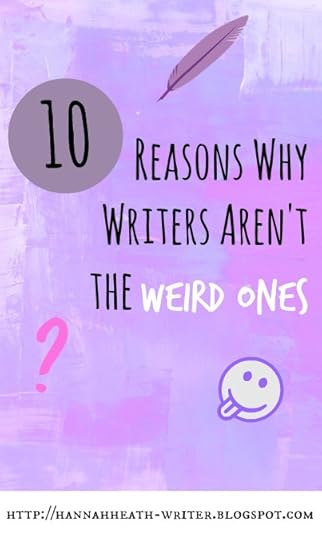 Writers aren't the ones confined to a single place and time. Writers get the opportunity to delve into new worlds and time periods whenever we want to. Not only does this expand the mind, but it feeds the soul. We're not the ones who sit in front of a TV or open a book and have thoughts and ideas fed to us. We're the ones who get to dig in and discover concepts for ourselves through putting words on paper. Unlike most people, we get to go to work in our pajamas. Some say weird, some say lazy, but seriously? We all know that this is every sane person's dream. We don't have to struggle with boredom. How can we be? Ideas are always hanging about us, just waiting to be snatched up and used. We can sit in one place for hours, just thinking, wondering, asking ourselves questions. Other people have to play with handheld electronic devices to stave off boredom. We don't. Which is good, because we really can't afford them anyway...We're good with words, so we don't look dumb on social media. You cannot use "their" in place of "they're." You just can't. Please stop trying. Writers are like a mini, specialized, walking Google. Because it's a writer's job to know a little bit about everything and a lot about some things, we have some major stores of knowledge. Have questions about Mongolian mythology? Want to know how to put together a good sales pitch? Interested in learning about the Great Fire of London? Need to learn how to work Twitter or Office Word? We're your people. What seems like random information to some can actually turn out to be very helpful. And it makes us look smart. Bonus! We know how to have fun. Not only can we hold conversations in book and movie quotes, but we can appreciate spoofs like Galaxy Quest, are fine with running around Disneyland and bookstores like little kids, and are capable of wielding sarcasm like a sword. While non-writers can get really stressed and don't know what to do with it all, writers are able to switch on the fun when too much pressure arises. Why? Because we constantly have to immerse ourselves in alien worlds to write, so we can apply that "quick switch" concept to having fun. Okay, so maybe not all the time. We get upset and angry just like other people, in which case...When writers get angry, we can just kill off the objects of our anger. How? By writing it (be it a person, emotion, or problem) into a story and then smashing it to pieces. Okay, so maybe writing an acquaintance into a story and then pushing him off a cliff is a bit weird...But it's better than cold-blooded murder, right? Right?
Writers aren't the ones confined to a single place and time. Writers get the opportunity to delve into new worlds and time periods whenever we want to. Not only does this expand the mind, but it feeds the soul. We're not the ones who sit in front of a TV or open a book and have thoughts and ideas fed to us. We're the ones who get to dig in and discover concepts for ourselves through putting words on paper. Unlike most people, we get to go to work in our pajamas. Some say weird, some say lazy, but seriously? We all know that this is every sane person's dream. We don't have to struggle with boredom. How can we be? Ideas are always hanging about us, just waiting to be snatched up and used. We can sit in one place for hours, just thinking, wondering, asking ourselves questions. Other people have to play with handheld electronic devices to stave off boredom. We don't. Which is good, because we really can't afford them anyway...We're good with words, so we don't look dumb on social media. You cannot use "their" in place of "they're." You just can't. Please stop trying. Writers are like a mini, specialized, walking Google. Because it's a writer's job to know a little bit about everything and a lot about some things, we have some major stores of knowledge. Have questions about Mongolian mythology? Want to know how to put together a good sales pitch? Interested in learning about the Great Fire of London? Need to learn how to work Twitter or Office Word? We're your people. What seems like random information to some can actually turn out to be very helpful. And it makes us look smart. Bonus! We know how to have fun. Not only can we hold conversations in book and movie quotes, but we can appreciate spoofs like Galaxy Quest, are fine with running around Disneyland and bookstores like little kids, and are capable of wielding sarcasm like a sword. While non-writers can get really stressed and don't know what to do with it all, writers are able to switch on the fun when too much pressure arises. Why? Because we constantly have to immerse ourselves in alien worlds to write, so we can apply that "quick switch" concept to having fun. Okay, so maybe not all the time. We get upset and angry just like other people, in which case...When writers get angry, we can just kill off the objects of our anger. How? By writing it (be it a person, emotion, or problem) into a story and then smashing it to pieces. Okay, so maybe writing an acquaintance into a story and then pushing him off a cliff is a bit weird...But it's better than cold-blooded murder, right? Right?  Writing with this mug should give people fair warning, yes?
Writing with this mug should give people fair warning, yes? We get to see things other people don't. We see messages, ideas, and stories in everything: the little girl crossing the street, that annoying crow that won't stop cawing. We can see beauty where nobody would think to look for it. So maybe we do live in a different world than most, but it's a great place to live. You should visit sometime.We have a legitimate excuse for watching netflix, drinking tons of caffeinated drinks, and having a strange search history. It helps with our creative process. What's your excuse? We know we're weird. But we also know we're not weird in a bad way. In other words: Crazy people don't know they're crazy. We know we are crazy, therefore, we are not crazy. Isn't that crazy? So, really, we writers have a lot going for us. Sure, we're a bit bonkers. But not in a bad way. We just look at the world a little bit differently, and that's okay. We don't make fun of non-writers for not being able to identify a strong character arc. We think it's kind of cute when they overlook symbolism in a movie or see only one way to approach a problem. We see them as a bit odd, and they see us as weirdos. That's alright, because, at the the end of the day, the world needs both of us.
We get to see things other people don't. We see messages, ideas, and stories in everything: the little girl crossing the street, that annoying crow that won't stop cawing. We can see beauty where nobody would think to look for it. So maybe we do live in a different world than most, but it's a great place to live. You should visit sometime.We have a legitimate excuse for watching netflix, drinking tons of caffeinated drinks, and having a strange search history. It helps with our creative process. What's your excuse? We know we're weird. But we also know we're not weird in a bad way. In other words: Crazy people don't know they're crazy. We know we are crazy, therefore, we are not crazy. Isn't that crazy? So, really, we writers have a lot going for us. Sure, we're a bit bonkers. But not in a bad way. We just look at the world a little bit differently, and that's okay. We don't make fun of non-writers for not being able to identify a strong character arc. We think it's kind of cute when they overlook symbolism in a movie or see only one way to approach a problem. We see them as a bit odd, and they see us as weirdos. That's alright, because, at the the end of the day, the world needs both of us.
So, to the non-writers out there: please don't call us crazy for staring off into space or thinking about things a bit too hard. If you refrain from that. then we'll stop pointing out your atrocious grammar and affinity for misinterpreting story-lines....At least out loud, anyway.
What about you? Can you list some fun, practical parts about being a writer? Leave a comment below! And if you're a non-writer, feel free to list some of the benefits to not having words constantly on your mind.
Related articles:
10 Things Nobody Tells You About Being A Writer Until It's Too Late
12 Ridiculous Questions Non-Writers Ask Writers (And 12 Ways to Respond to Them)
15 Things I Love About Being A Writer
Enjoy this post? Take a look around. If you like what you see, please don't forget to subscribe by email for a new post every week!
Some links are Amazon affiliate links. Thank you for supporting a poor writer.
To kick off the new year, I wanted to write a post about something that's been bothering me for a while: The idea that writers are just plain weird (and not in a good way). I mean, I understand that writers are a bit different, and I'm proud to wear the "weird writer" badge. But I'm always hearing derogatory remarks about the oddness of writers and readers. For example:
"Oh, don't mind her. She's a writer, so she gets odd ideas about things."
"Yeah, a lot of writers are crazy, so you gotta be careful to make sure you don't turn out like them."
"He's just a bit off. He spends too much time writing."
Sound familiar? Probably. We see it depicted in books and movies: the reclusive creative, the author struggling with alcoholism, the person who spends so much time writing that life passes them by.
And I've always found it hilarious because, from where I'm sitting, non-writers are just as strange (and just as likely to be crazy) as us creatives. My proof? Here are 10 reasons why writers aren't the weird ones:
 Writers aren't the ones confined to a single place and time. Writers get the opportunity to delve into new worlds and time periods whenever we want to. Not only does this expand the mind, but it feeds the soul. We're not the ones who sit in front of a TV or open a book and have thoughts and ideas fed to us. We're the ones who get to dig in and discover concepts for ourselves through putting words on paper. Unlike most people, we get to go to work in our pajamas. Some say weird, some say lazy, but seriously? We all know that this is every sane person's dream. We don't have to struggle with boredom. How can we be? Ideas are always hanging about us, just waiting to be snatched up and used. We can sit in one place for hours, just thinking, wondering, asking ourselves questions. Other people have to play with handheld electronic devices to stave off boredom. We don't. Which is good, because we really can't afford them anyway...We're good with words, so we don't look dumb on social media. You cannot use "their" in place of "they're." You just can't. Please stop trying. Writers are like a mini, specialized, walking Google. Because it's a writer's job to know a little bit about everything and a lot about some things, we have some major stores of knowledge. Have questions about Mongolian mythology? Want to know how to put together a good sales pitch? Interested in learning about the Great Fire of London? Need to learn how to work Twitter or Office Word? We're your people. What seems like random information to some can actually turn out to be very helpful. And it makes us look smart. Bonus! We know how to have fun. Not only can we hold conversations in book and movie quotes, but we can appreciate spoofs like Galaxy Quest, are fine with running around Disneyland and bookstores like little kids, and are capable of wielding sarcasm like a sword. While non-writers can get really stressed and don't know what to do with it all, writers are able to switch on the fun when too much pressure arises. Why? Because we constantly have to immerse ourselves in alien worlds to write, so we can apply that "quick switch" concept to having fun. Okay, so maybe not all the time. We get upset and angry just like other people, in which case...When writers get angry, we can just kill off the objects of our anger. How? By writing it (be it a person, emotion, or problem) into a story and then smashing it to pieces. Okay, so maybe writing an acquaintance into a story and then pushing him off a cliff is a bit weird...But it's better than cold-blooded murder, right? Right?
Writers aren't the ones confined to a single place and time. Writers get the opportunity to delve into new worlds and time periods whenever we want to. Not only does this expand the mind, but it feeds the soul. We're not the ones who sit in front of a TV or open a book and have thoughts and ideas fed to us. We're the ones who get to dig in and discover concepts for ourselves through putting words on paper. Unlike most people, we get to go to work in our pajamas. Some say weird, some say lazy, but seriously? We all know that this is every sane person's dream. We don't have to struggle with boredom. How can we be? Ideas are always hanging about us, just waiting to be snatched up and used. We can sit in one place for hours, just thinking, wondering, asking ourselves questions. Other people have to play with handheld electronic devices to stave off boredom. We don't. Which is good, because we really can't afford them anyway...We're good with words, so we don't look dumb on social media. You cannot use "their" in place of "they're." You just can't. Please stop trying. Writers are like a mini, specialized, walking Google. Because it's a writer's job to know a little bit about everything and a lot about some things, we have some major stores of knowledge. Have questions about Mongolian mythology? Want to know how to put together a good sales pitch? Interested in learning about the Great Fire of London? Need to learn how to work Twitter or Office Word? We're your people. What seems like random information to some can actually turn out to be very helpful. And it makes us look smart. Bonus! We know how to have fun. Not only can we hold conversations in book and movie quotes, but we can appreciate spoofs like Galaxy Quest, are fine with running around Disneyland and bookstores like little kids, and are capable of wielding sarcasm like a sword. While non-writers can get really stressed and don't know what to do with it all, writers are able to switch on the fun when too much pressure arises. Why? Because we constantly have to immerse ourselves in alien worlds to write, so we can apply that "quick switch" concept to having fun. Okay, so maybe not all the time. We get upset and angry just like other people, in which case...When writers get angry, we can just kill off the objects of our anger. How? By writing it (be it a person, emotion, or problem) into a story and then smashing it to pieces. Okay, so maybe writing an acquaintance into a story and then pushing him off a cliff is a bit weird...But it's better than cold-blooded murder, right? Right?  Writing with this mug should give people fair warning, yes?
Writing with this mug should give people fair warning, yes? We get to see things other people don't. We see messages, ideas, and stories in everything: the little girl crossing the street, that annoying crow that won't stop cawing. We can see beauty where nobody would think to look for it. So maybe we do live in a different world than most, but it's a great place to live. You should visit sometime.We have a legitimate excuse for watching netflix, drinking tons of caffeinated drinks, and having a strange search history. It helps with our creative process. What's your excuse? We know we're weird. But we also know we're not weird in a bad way. In other words: Crazy people don't know they're crazy. We know we are crazy, therefore, we are not crazy. Isn't that crazy? So, really, we writers have a lot going for us. Sure, we're a bit bonkers. But not in a bad way. We just look at the world a little bit differently, and that's okay. We don't make fun of non-writers for not being able to identify a strong character arc. We think it's kind of cute when they overlook symbolism in a movie or see only one way to approach a problem. We see them as a bit odd, and they see us as weirdos. That's alright, because, at the the end of the day, the world needs both of us.
We get to see things other people don't. We see messages, ideas, and stories in everything: the little girl crossing the street, that annoying crow that won't stop cawing. We can see beauty where nobody would think to look for it. So maybe we do live in a different world than most, but it's a great place to live. You should visit sometime.We have a legitimate excuse for watching netflix, drinking tons of caffeinated drinks, and having a strange search history. It helps with our creative process. What's your excuse? We know we're weird. But we also know we're not weird in a bad way. In other words: Crazy people don't know they're crazy. We know we are crazy, therefore, we are not crazy. Isn't that crazy? So, really, we writers have a lot going for us. Sure, we're a bit bonkers. But not in a bad way. We just look at the world a little bit differently, and that's okay. We don't make fun of non-writers for not being able to identify a strong character arc. We think it's kind of cute when they overlook symbolism in a movie or see only one way to approach a problem. We see them as a bit odd, and they see us as weirdos. That's alright, because, at the the end of the day, the world needs both of us.So, to the non-writers out there: please don't call us crazy for staring off into space or thinking about things a bit too hard. If you refrain from that. then we'll stop pointing out your atrocious grammar and affinity for misinterpreting story-lines....At least out loud, anyway.
What about you? Can you list some fun, practical parts about being a writer? Leave a comment below! And if you're a non-writer, feel free to list some of the benefits to not having words constantly on your mind.
Related articles:
10 Things Nobody Tells You About Being A Writer Until It's Too Late
12 Ridiculous Questions Non-Writers Ask Writers (And 12 Ways to Respond to Them)
15 Things I Love About Being A Writer
Enjoy this post? Take a look around. If you like what you see, please don't forget to subscribe by email for a new post every week!
Some links are Amazon affiliate links. Thank you for supporting a poor writer.

Published on January 01, 2016 07:12
December 25, 2015
Pumpkin Juice Inspired by J.K. Rowling's Harry Potter and the Chamber of Secrets
Merry Christmas everyone! Enjoy reading this post, but don't forget to get out there and have a magical day with family and friends...
People wish for different things in life. Some people want to be rich and famous, others want to live peacefully, surrounded by a loving family.
Me? My wish is simple.
Guys, I want a castle.
Hogwarts castle, to be exact.
 Especially if I could travel to it by flying car with Ron and Harry. I'd even be willing to crash into the Whomping Willow if it meant I'd get a shot at that. Of course I didn't realize this was such a keen desire of mine until I read Harry Potter and the Chamber of Secrets.
Especially if I could travel to it by flying car with Ron and Harry. I'd even be willing to crash into the Whomping Willow if it meant I'd get a shot at that. Of course I didn't realize this was such a keen desire of mine until I read Harry Potter and the Chamber of Secrets. Not only does this book continue to develop already beloved characters, but it brings in some fun new ones, such as Ginny, Moaning Myrtle, Dobby, and Lockheart. For those of you who don't know the plot, well, that's kind of unacceptable. But here's a brief synopsis anyway, which I stole from Amazon. I usually write my own, but I'm cheating this time. It's Christmas. Cut me some slack:
The Dursleys were so mean that hideous that summer that all Harry Potter wanted was to get back to the Hogwarts School for Witchcraft and Wizardry. But just as he's packing his bags, Harry receives a warning from a strange, impish creature named Dobby who says that if Harry Potter returns to Hogwarts, disaster will strike.
And strike it does. For in Harry's second year at Hogwarts, fresh torments and horrors arise, including an outrageously stuck-up new professor, Gilderoy Lockheart, a spirit named Moaning Myrtle who haunts the girls' bathroom, and the unwanted attentions of Ron Weasley's younger sister, Ginny.
But each of these seem minor annoyances when the real trouble begins, and someone--or something--starts turning Hogwarts students to stone. Could it be Draco Malfoy, a more poisonous rival than ever? Could it possibly be Hagrid, whose mysterious past is finally told? Or could it be the one everyone at Hogwarts most suspects...Harry Potter himself?
I know this particular Harry Potter book gets a bad rap. A lot of people didn't like Lockheart (Hint: you weren't supposed) and were annoyed that much of it didn't seemed relevant (the Basilisk, Ginny's character, the diary that randomly "dies," bits of Tom Riddle's back story) until the later books.
However, I am a fan of this story. I pretty much liked all of these books, though, so you're probably never going to hear me complain about any of them. I like everything about them: the character development, the friendships, the morals, the good vs evil, the redemption. Oh, and the food. I love reading about the feasts in the great hall.
Something I've always wanted to try is pumpkin juice, which makes an appearance in almost every Harry Potter book. I wasn't sure whether it was in this one, but, as Ron says of Hermoine: When in doubt, go the the library. So I went to my library (which consists of 2 bookshelves, but hey, it's a start), and found that pumpkin juice does show up in Harry Potter and the Chamber of Secrets.
After Harry and Ron crash into the whomping willow and narrowly escape having Snape expel them, McGonagall conjures up a meal for them, including a "jug of iced pumpkin juice." So I knew that's what I wanted to make today. It turned out beautifully. Check it out:
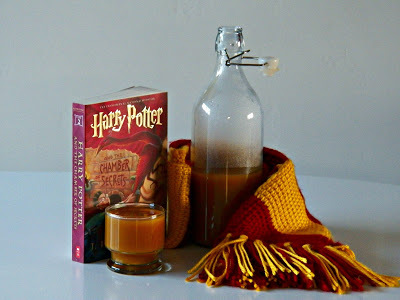 Ingredients -
Ingredients - 2 cups of apricot nectar. I used the R.W. Knudsen juice, which is a mixture of apple, apricot, pineapple, and peach. But it doesn't really matter what brand you use. 1 cup of spiced cider 8 tablespoons of pumpkin puree Ron's emotional range of vanilla. For those of you who don't speak Harry Potter, that's one teaspoon of vanilla. 1/4 teaspoon of nutmeg 1 tablespoon of honey1 cinnamon stickDirections -
1. Throw all ingredients in a vitamix and blend. Except the cinnamon stick. Leave that out, though hopefully you don't need me to tell you that.
 2. Pour drink into a saucepan with cinnamon stick and simmer for 20 minutes. Remove the cinnamon and allow to cool.
2. Pour drink into a saucepan with cinnamon stick and simmer for 20 minutes. Remove the cinnamon and allow to cool. 3. Serve chilled or over ice. This makes about 3 cups.
And that's it. Almost as easy as using a wand, and super tasty. It doesn't have a super strong pumpkin flavor, but it can if you want to add more puree to it. I love it and yes, I'm drinking it as I write.
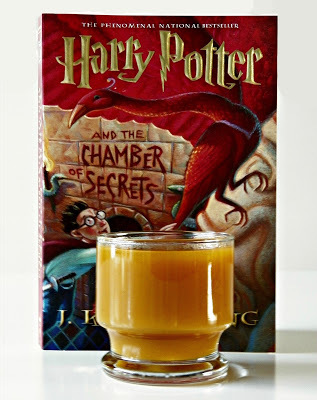 You don't have to have any kind of skill to make this, which is fun. Remember, it's our choices that show what we truly are, far more than our abilities. So choose to make pumpkin juice and show your inner Harry Potter.
You don't have to have any kind of skill to make this, which is fun. Remember, it's our choices that show what we truly are, far more than our abilities. So choose to make pumpkin juice and show your inner Harry Potter.
 My friend over at Tea with Tumnus made me the Gryffindor scarf. Isn't it the coolest thing ever? I'm one of those weird people that ends up in Gryffindor half the time and Ravenclaw the other half. Does that happen to anyone else? Oh well. I'd be happy in either of those houses.
My friend over at Tea with Tumnus made me the Gryffindor scarf. Isn't it the coolest thing ever? I'm one of those weird people that ends up in Gryffindor half the time and Ravenclaw the other half. Does that happen to anyone else? Oh well. I'd be happy in either of those houses. What's your favorite food from Harry Potter? Have you ever had pumpkin juice? Leave a comment below and don't forget to tell me what you think of Harry Potter and the Chamber of Secrets ! Until then I'll be in my room, reading Harry Potter and pretending I'm not there.
Oh, and have a happy Christmas!
Related articles -
Mrs. Weasley's Chocolate Fudge Inspired by Harry Potter and The Sorcerer's Stone
Gluten-Free Orange And Clove Scone Inspired by G.K. Chesterton
Cherry Pop Inspired by Jack Schaefer's Shane
Enjoy this post? Take a look around. If you like what you see, please don't forget to subscribe by email for a new post every Friday!
Some links are Amazon affiliate links. Thank you for supporting a poor writer.

Published on December 25, 2015 07:11
December 21, 2015
11 Tips for Building a Successful Writer's Platform
Recently, I’ve received several requests to write a post about how to build an writer's platform. Which makes sense, because this is probably one of the most difficult parts about being a writer. The act of writing is a very solitary task, but the act of selling that writing? You have to get out and interact. You have to impress. You have to sell. You have to talk. To people. Yeah. Those scary organisms many writers actively avoid.
I can just hear you groaning, “People. Why’d it have to be people?” Because we live in an era where everyone and their mother has the means to write and publish a book and market it on social media, that’s why. There’s a lot of competition, so getting out there and working to make friends and connections is the only way to get an edge.
But how do you get that edge? Well, I have good news for you. With the release of my debut story, I finally was able to put my platform to the test. And you know what? It didn’t collapse. So apparently I know what I’m doing. I guess. And I’d be more than happy to share with you some tips I’ve found helpful through my journey, as well as some points I wish people had told me before I started. Ready? Take a deep breath. Try not to get stressed. Let’s go:
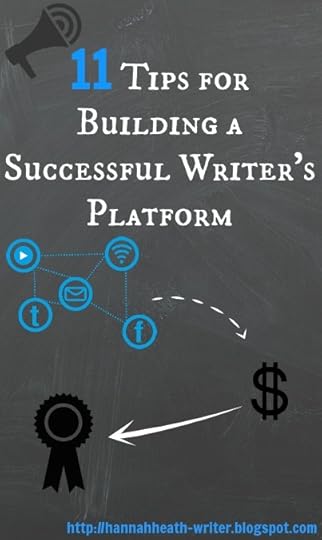 The sooner you start your platform, the better. There really isn’t any good reason for waiting. Your platform isn’t going to build itself, so you might as well get started now. You do not have to have a published work to start up a blog or jump into social media. In fact, it’s better to get into this before you publish, for reasons I’ll explain later.Start with social media, and start slowly. Do you hear me? Start slowly. Otherwise you’ll get stressed, have a panic attack, choke on your coffee, pass out, hit your head on your bookshelf, and get a concussion. And we wouldn’t want that, now would we? Try starting with one or two social medias. I recommend Pinterest and Twitter for starters. Pinterest because it will be helpful for generated blog views later on (I get 80% of my visitors from Pinterest), and Twitter because it’s a good way to make personal connections with other readers and writers. After a month or so with those, you can branch out to a few more. Once you know you have a hang of that and haven’t gone into shock, then you can try starting up a blog.Make people like you. Building an author’s platform is a lot like the Hunger Games: You need to make the masses love you, otherwise nobody will sponsor you and you’ll be among the first to die. This is why I recommend starting social media first, then a blog, then publishing. That way people can get a sense for you as a person via social media before you start trying to sell them whatever it is you’re peddling. So when you jump in to social media, be yourself. Interact with other people. Show them who you are. How? Try this:Establish your online personality. Chances are, you have a lot of interests and a very diverse personality. Unfortunately, that’s a bit hard to pull off on social media. So pick parts of your personality that you think will serve you and your followers well. Now, I am NOT saying that you need to fake it. That doesn’t work. Just hone in on specific parts of you that you can easily display. Me? I built myself up as a sarcastic, funny, nerdy writer on a mission to create stories with meaning. That’s how I am in real life, which is why it works. Of course there are other sides of me (like the fact that I’m majoring in Nutrition or fighting Lyme or have a thing for classic movies), but I don’t broadcasts those as much because it’s too much information and often irrelevant. Pinpoint what makes you interesting and unique, then flaunt it. However….Don’t pigeon-hole yourself. You may write gothic fiction now, but what if you decide to branch of into historical fiction? You don’t want to be stuck with a platform geared only towards readers of gothic literature. And just because you’re a writer building a platform doesn’t mean you have to only tweet/pin/post about writing. Basically, you platform has to be broad enough to attract all kinds of people, but not so broad that people stumble across you on the web and can’t figure out what the heck your gig is or how it’s relevant to them.Remember that it’s not about you. Your platform needs to somehow be helpful to other people, otherwise they’re not going to want to follow you. Nobody cares what you ate for lunch or how your Aunt Peggy just bought you the most hideous purple sweater on earth (unless you can make a funny joke about it. Then make a funny joke. Never pass those up). You need to keep the focus on your audience. Some examples of how to do this would be: cheering people on via twitter, leaving reviews for indie writers, writing posts about topics you know people need help with, making people smile, and causing people to stop and think.Be friendly and helpful. Read and comment on other people’s blogs. Say hi to people on social media. Ask them what they’re doing, how they are, look around and see what people need help with. Be a decent, supportive human being and people are going to want to hang around.Don't be shy. If you want something, just ask. Do you want people to share your posts on social media? Put a little request at the bottom of your article. Do you want people to review your book? Just send them a tweet. The worst thing that can happen will be them rejecting you. Just shake it off. They probably don't have very good taste anyway.Don’t be obnoxious. I touched on this above, but I’m going to repeat myself because it seems like a lot of knuckleheads are ignoring this advice: While it's okay to be tenacious, don’t be a pest. Don’t expect other people to hand things to you just because you ask. Maybe you are brilliant, but don’t attack people for disagreeing with you. Try not to always be shouting about you, and what you did, what you’re doing, what so and so said about you. Nobody cares. Sorry.Find a writer that you enjoy and take tips from them. Do you have a blog you constantly read? Figure out what that blogger is doing right and apply it to your own platform. Follow fun people on social media and take mental notes of what they do that makes them fun. Use this for ideas only. Don’t be a copycat and always try to put your own personal spin on it. And don’t stalk people. I don’t care how many people think Edward Cullens was cute. Stalking is not cute. It’s creepy. Don’t do it. Ever.Remember that you’re going to screw up. And that’s okay. People aren’t perfect and nobody expects you to be…except maybe you. So stop expecting that and just open yourself up to exploring and having fun.Sounds scary, doesn’t it? That’s okay. Nothing worthwhile is ever easy. In the words of Grandmother willow: “Sometimes the right path is not the easiest.” So take a step back. Breathe. Everything is going to be fine. You can do this.
The sooner you start your platform, the better. There really isn’t any good reason for waiting. Your platform isn’t going to build itself, so you might as well get started now. You do not have to have a published work to start up a blog or jump into social media. In fact, it’s better to get into this before you publish, for reasons I’ll explain later.Start with social media, and start slowly. Do you hear me? Start slowly. Otherwise you’ll get stressed, have a panic attack, choke on your coffee, pass out, hit your head on your bookshelf, and get a concussion. And we wouldn’t want that, now would we? Try starting with one or two social medias. I recommend Pinterest and Twitter for starters. Pinterest because it will be helpful for generated blog views later on (I get 80% of my visitors from Pinterest), and Twitter because it’s a good way to make personal connections with other readers and writers. After a month or so with those, you can branch out to a few more. Once you know you have a hang of that and haven’t gone into shock, then you can try starting up a blog.Make people like you. Building an author’s platform is a lot like the Hunger Games: You need to make the masses love you, otherwise nobody will sponsor you and you’ll be among the first to die. This is why I recommend starting social media first, then a blog, then publishing. That way people can get a sense for you as a person via social media before you start trying to sell them whatever it is you’re peddling. So when you jump in to social media, be yourself. Interact with other people. Show them who you are. How? Try this:Establish your online personality. Chances are, you have a lot of interests and a very diverse personality. Unfortunately, that’s a bit hard to pull off on social media. So pick parts of your personality that you think will serve you and your followers well. Now, I am NOT saying that you need to fake it. That doesn’t work. Just hone in on specific parts of you that you can easily display. Me? I built myself up as a sarcastic, funny, nerdy writer on a mission to create stories with meaning. That’s how I am in real life, which is why it works. Of course there are other sides of me (like the fact that I’m majoring in Nutrition or fighting Lyme or have a thing for classic movies), but I don’t broadcasts those as much because it’s too much information and often irrelevant. Pinpoint what makes you interesting and unique, then flaunt it. However….Don’t pigeon-hole yourself. You may write gothic fiction now, but what if you decide to branch of into historical fiction? You don’t want to be stuck with a platform geared only towards readers of gothic literature. And just because you’re a writer building a platform doesn’t mean you have to only tweet/pin/post about writing. Basically, you platform has to be broad enough to attract all kinds of people, but not so broad that people stumble across you on the web and can’t figure out what the heck your gig is or how it’s relevant to them.Remember that it’s not about you. Your platform needs to somehow be helpful to other people, otherwise they’re not going to want to follow you. Nobody cares what you ate for lunch or how your Aunt Peggy just bought you the most hideous purple sweater on earth (unless you can make a funny joke about it. Then make a funny joke. Never pass those up). You need to keep the focus on your audience. Some examples of how to do this would be: cheering people on via twitter, leaving reviews for indie writers, writing posts about topics you know people need help with, making people smile, and causing people to stop and think.Be friendly and helpful. Read and comment on other people’s blogs. Say hi to people on social media. Ask them what they’re doing, how they are, look around and see what people need help with. Be a decent, supportive human being and people are going to want to hang around.Don't be shy. If you want something, just ask. Do you want people to share your posts on social media? Put a little request at the bottom of your article. Do you want people to review your book? Just send them a tweet. The worst thing that can happen will be them rejecting you. Just shake it off. They probably don't have very good taste anyway.Don’t be obnoxious. I touched on this above, but I’m going to repeat myself because it seems like a lot of knuckleheads are ignoring this advice: While it's okay to be tenacious, don’t be a pest. Don’t expect other people to hand things to you just because you ask. Maybe you are brilliant, but don’t attack people for disagreeing with you. Try not to always be shouting about you, and what you did, what you’re doing, what so and so said about you. Nobody cares. Sorry.Find a writer that you enjoy and take tips from them. Do you have a blog you constantly read? Figure out what that blogger is doing right and apply it to your own platform. Follow fun people on social media and take mental notes of what they do that makes them fun. Use this for ideas only. Don’t be a copycat and always try to put your own personal spin on it. And don’t stalk people. I don’t care how many people think Edward Cullens was cute. Stalking is not cute. It’s creepy. Don’t do it. Ever.Remember that you’re going to screw up. And that’s okay. People aren’t perfect and nobody expects you to be…except maybe you. So stop expecting that and just open yourself up to exploring and having fun.Sounds scary, doesn’t it? That’s okay. Nothing worthwhile is ever easy. In the words of Grandmother willow: “Sometimes the right path is not the easiest.” So take a step back. Breathe. Everything is going to be fine. You can do this. Remember that you’ve got a friend in me. If you have any questions or requests for a follow up post, please leave a comment or send me an email. I’d be more than happy to walk you through areas that you’re struggling with. And for those of you who have a hang of this author’s platform deal, please share your wisdom in the comment section!
Related articles:
Be A Writer, Not An Author
5 Steps to Fighting Off Writer's Insecurity (And Your Overactive Inner Critic)
Don't worry, I'll still be posting my usual Friday article. This is just a "special occasion" post. If you enjoyed it, take a look around. If you like what you see, please don't forget to subscribe by email for a new post every Friday!

Published on December 21, 2015 07:39
December 18, 2015
Tips for Writing Stunning Science-Fiction: A Guest Post by Author S. Alex Martin
I'd like to introduce you all to one of my favorite indie authors: S. Alex Martin. He writes futuristic sci-fi that is guaranteed to blow your mind, but more on that later. Today he's kindly agreed to explain the ins and outs of writing good, meaningful science-fiction. He has some helpful and thought-provoking things to say on the topic, so stop what you're doing and tune in. You're going to want to read this:
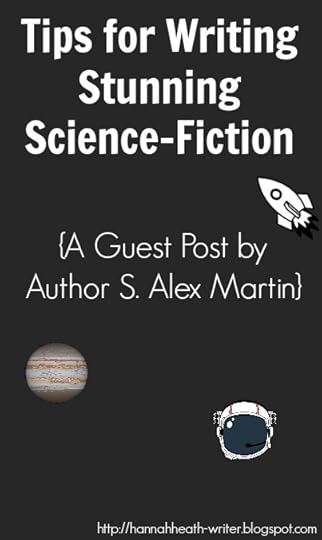 All of us, at one point or another, have thought about what the future holds in store. To ask “What if…” is one of the most human things to do. Our curiosity drives us to explore and create and leave an impact on the world. We look ahead thirty, forty years and try to envision where our own lives will be, but it’s also important to look further ahead, beyond the horizons of our own lives.
All of us, at one point or another, have thought about what the future holds in store. To ask “What if…” is one of the most human things to do. Our curiosity drives us to explore and create and leave an impact on the world. We look ahead thirty, forty years and try to envision where our own lives will be, but it’s also important to look further ahead, beyond the horizons of our own lives.Science-fiction plays an important role here; specifically, futuristic science-fiction, where events are grounded in reality. Perhaps we explore worlds yet-unknown, use technologies yet to be invented, or question our role in the cosmos as we seek to inhabit them.
I’m someone who grew up fascinated with astronomy, whose love of space exploration and its impact on humanity only grew through the years. So it comes as a surprise to many people when they find out I’m an author of futuristic science-fiction. Naturally, the next question is, “What are your books about?” I always find it difficult to answer this question. Simply put, the answer is pretty complicated.
When most people think of science-fiction, they think strange planets with grotesque aliens (or humanoid, for that matter). They think of battles in space, of giant laser cannons, and evil empires, and robots taking over the world. Admittedly, all of this makes for flashier, more exciting science-fiction.
But people often forget about the quieter side of sci-fi. For me, it’s the quieter side that’s so fascinating. Where human endurance is tested, where our technological endeavors are celebrated, rather than vilified. I think it’s important to keep humanity in the equation. When I say that, I don’t mean, “aliens are invading Earth and it’s up to the chosen one to save the world.”
Try exploring what makes us human. Show how the characters live in their world, how they’re impacted as individuals. Show them making discoveries of their own, both externally and internally. What makes them human? (or whatever species they are). Explore what led to them being where they are at the beginning of the story, and take them on a journey where they come to discover something about themselves or the world around them.
The more your reader can connect to your characters on a human, emotional level, the more engaged with and moved by the story they will be overall.
If you’re writing a story with space travel, choose carefully. How fast can spaceships travel between stars? Me? I prefer a safe in-between compromise. Faster than realistic space travel (The Martian; 2001: A Space Odyssey) but slower than near-instantaneous “popping” between stars (Star Trek; Star Wars). I’ve come up with a feasible explanation for why space travel is an easy couple-week trip between stars.
It’s important to choose how fast ships can travel, because travel time will directly affect the story’s plot and pacing. If bad things are happening on a planet, and it takes the hero(es) months or years to arrive, chances are they won’t show up in the nick of time to save the day. On the other hand, if space travel happens instantly, then you’ll want to account for that.
Long story short, travel time matters when stories are set in space!
Planets. Not every planet is Earth. You’ll want to consider how people get food and water, how societies function across different planets, how people from one planet view people from another planet. Why were certain planets chosen to inhabit, and others not? How are people sustaining themselves on a barren desert world? How are they breathing? How long do they live? How are their bodies different from people on other planets? Is non-human life struggling or thriving?
Thinking about survivability and lifestyles, what technologies can each planet support? Do they all have the latest-and-greatest tech? Or is there some standard baseline that new settlements on other worlds begin at, and they build from there? Does the planet that settled that world have oversight? Or do they let the new world choose its own way of life? Is a planet settling other planets for the sake of building an empire? Or what motivates them to spread through the cosmos? Answering these questions can add even more depth to your backstory.
When I write science-fiction, I strive to develop a framework for where humanity could go over the next few millennia. I research ecosystems various planets could have, maintain technologies that are consistent with individual settlements on different worlds, and establish political and scientific structures that build into the history and goings-on within the story. My goal is to inspire readers to question what the future may hold for humanity, and what they can add to the world.
If you ever choose to write science-fiction, keep in mind what you want people to discover, what you want people to get out of the story you tell. Will you put humanity at its lowest point, struggling to rise from the ashes? Or will you take to the stars and put humanity into a golden age of exploration and discovery? Whatever you choose, build your world consistently. Blend in flavor and wonder and excitement. Science-fiction holds so many opportunities, and the future is wide open. So ask “What if…” and set your story in motion. It could change the world.
Earlier I mentioned that S. Alex Martin is a favorite author of mine. I think now you can all understand why. Not only is he an author who knows how to write well, but he knows how to write with a purpose. His books, Embassy and Resonance, really took a hold of my mind because they feature a bright, exciting future in which humanity is making strides forward rather than tumbling into more death and destruction. This is a rarity in fiction nowadays, but something that I think we could all use a little more of.
So let's hear a round of applause for Alex Martin! If you enjoyed this post, which I know you did, then don't forget to show him some love on the web. Find him on:
His Awesome Website | Twitter | Pinterest | Tumblr | Amazon
Related articles: Challenging Writers to Create Stories With MeaningChallenging Creative Writers To Be More Creative8 Stereotypes in YA Dystopian Novels
Enjoy this post? Take a look around. If you like what you see, please don't forget to subscribe by email for a new post every week!
Some links are Amazon affiliate links. Thank you for supporting a poor writer.

Published on December 18, 2015 07:12
December 11, 2015
Writing Surfer Characters: 9 Things You Need to Know
Surfers.
You think you know them. They live in Hawaii, have blonde hair, smoke pot, cut classes, and are generally up to no good. They like to skate in their free time. They usually don't have any money, but they still manage to come across as super chill and cool.
That tends to be people's general view of surfers. Authors tend to reflect this view, or decide to reflect nothing at all by completely excluding surfers from their list of potential characters.
Which is a shame, because surfers are a...
You think you know them. They live in Hawaii, have blonde hair, smoke pot, cut classes, and are generally up to no good. They like to skate in their free time. They usually don't have any money, but they still manage to come across as super chill and cool.
That tends to be people's general view of surfers. Authors tend to reflect this view, or decide to reflect nothing at all by completely excluding surfers from their list of potential characters.
Which is a shame, because surfers are a...
Published on December 11, 2015 07:26
December 4, 2015
Skies of Dripping Gold: Author's Website, News, and How You Can Help
Okay guys, stop what you’re doing. Listen up. This is important.
Do you know what today is? I mean, other than being Friday. Today is December 4th, which is special because December 5thcomes right afterwards. Mind boggling, I know.
So why is December 5th important? It’s the day I’ll be releasing my debut short story, Skies of Dripping Gold, on Amazon.
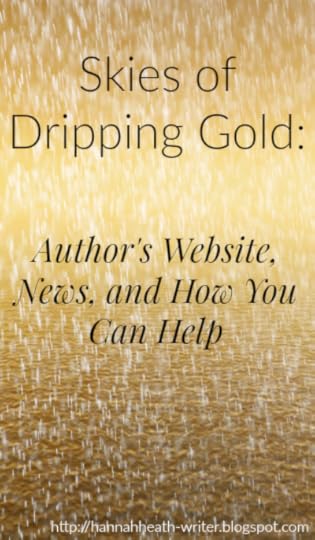 The Kindle version is available for pre-order on Amazon, so head on over and check it out. You will have the ebook sent directly to your Kindle on December 5th (tomorrow). Also, the physical version is available on my CreateSpace Estore. It will be available on Amazon in 3 to 5 days (I'm currently waiting on Amazon to build a page for it), but if you're impatient, you can sign up for a CreateSpace account and buy it through there.
The Kindle version is available for pre-order on Amazon, so head on over and check it out. You will have the ebook sent directly to your Kindle on December 5th (tomorrow). Also, the physical version is available on my CreateSpace Estore. It will be available on Amazon in 3 to 5 days (I'm currently waiting on Amazon to build a page for it), but if you're impatient, you can sign up for a CreateSpace account and buy it through there. Oh, and check this out:
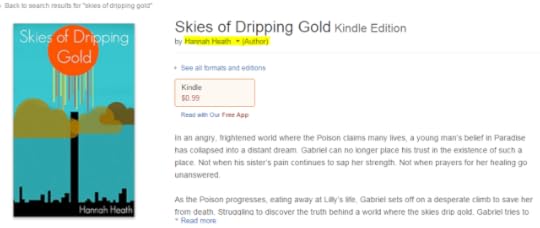
See that? The word “author” is right there next to my name. How cool is that? Fortune and glory, kid. Fortune and glory.
Except, you know, authors make practically no fortune and rarely any glory, but still. I’ve been working towards this for a while, and I’m pretty excited. I get to join the “Indie authors” league!
I also have another piece of exciting news to share: I now have an official author’s website! You can view it here: http://hannahheathwriter.com
Please check it out and share on social media. Also, note that I’m starting a monthly newsletter. You can subscribe on my website here. I’ll be sending out updates, writing tips, book recommendations, and a few other surprises through that forum.
So if you enjoy my writing and my blog, sign up for insider information! Join me, and together, we can rule the galaxy!
But, all nerd references aside, I’m thrilled to have the opportunity to share this story with you all. It’s one that is very special to me and one that I think will speak to a lot of people. It may look like a short story to other people, but, to me, it’s my heart on a paper (or, you know, electronics, if we count the Kindle version). It’s a blessing to be able to show you Skies of Dripping Gold.
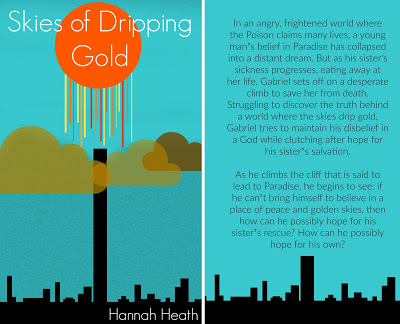 Now, this story is geared towards mature 13-year-olds and up. Because I know I have a few followers here who are a bit young , or perhaps a bit sensitive to certain kinds of content, I’d like to give you a brief parental review so you can decide who should and shouldn’t be reading this story:
Now, this story is geared towards mature 13-year-olds and up. Because I know I have a few followers here who are a bit young , or perhaps a bit sensitive to certain kinds of content, I’d like to give you a brief parental review so you can decide who should and shouldn’t be reading this story: Language The word “damn” is used 4 times and “hell” is used once as a profanity. “B*****d” is used twice in an acute situation. I do not use any of these words for shock value. They are all there for specific reasons and none of them are used without purpose. If you’d like to learn more about my policy on using cursing in fiction, you can read my article on that topic here.
Violence and sexual contentNone. I would never insult you or myself by weaving sexual content into my stories. And violence simply has no place in this particular short story.
DarknessI think I should clear something up right now: This story is not funny. Those of you who follow my blog or social media accounts may be expecting this story to be humorous, since that’s the direction my blogging tends to lean. However, Skies of Dripping Gold is not a funny story. It is what I refer to as “darkly inspirational,” meaning that the story is rather sad and dark in order to provide a more emphatic inspirational message. It’s a “light at the end of the tunnel” style that I tend to use in my dystopian writings.
Now, with that explained, if you decide to read this story (which you really, really should, because it’s darn good. Though I may be slightly biased), I’d love for you to help me out a bit. How can you do that? I’m glad you asked: Rate and review on Amazon. And if you give me something lower than 5 stars, I promise not to start screaming “Dishonor on you! Dishonor on your cow!” I’ll just be appreciative for a review.Share my website and my Amazon page on social media. Feel free to copy images directly from my site and share on Pinterest, Twitter, etc.
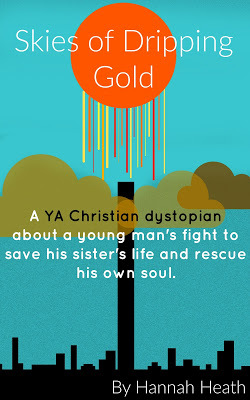 Review on your blog.Tell your family and friends.Review and recommend on Goodreads. Try whatever other marketing strategies look fun to you. Just think about how you may want to market yourstory when it’s out. Then test it out with my short story. You get practice and I get publicity. Win win.Remember that tomorrow (December 5th) is the release date. So let's make a lot of noise on Saturday!I doubt I could have gotten this far without all of your encouragement and help. Thank you for everything you have done for me up to this point, and thank you in advance for anything you feel moved to do in the future.
Review on your blog.Tell your family and friends.Review and recommend on Goodreads. Try whatever other marketing strategies look fun to you. Just think about how you may want to market yourstory when it’s out. Then test it out with my short story. You get practice and I get publicity. Win win.Remember that tomorrow (December 5th) is the release date. So let's make a lot of noise on Saturday!I doubt I could have gotten this far without all of your encouragement and help. Thank you for everything you have done for me up to this point, and thank you in advance for anything you feel moved to do in the future. You all are the coolest followers on earth. I'm entirely convinced that you guys are blessings in human form. I'd love to hear what you think about my website. And, of course, don't forget to tell me your thoughts about the short story when it's released tomorrow!
Related article:
Skies of Dripping Gold: Synopsis and Release Date
Skies of Dripping Gold: Cover Reveal
Enjoy this post? Take a look around. If you like what you see, please don't forget to subscribe by email for a new post every Friday!

Published on December 04, 2015 08:08
November 27, 2015
Peanut Brittle Inspired by Douglas Adams' Hitchhiker's Guide to the Galaxy
I have found the answer to all of your problems. Do you want to hear what it is? Are you ready? Are you sure? Alright then. The answer is....
42Allow me to introduce you to The Hitchhiker's Guide to the Galaxy by Douglas Adams, the most brilliant sci-fi comedy every written on any planet at any time. Don't panic, grab your towel, your Babel fish, and hitch along for the ride.
If you've ever landed on this blog before, you've probably recognized that I'm a slightly sarcastic person. Slightly. I...
42Allow me to introduce you to The Hitchhiker's Guide to the Galaxy by Douglas Adams, the most brilliant sci-fi comedy every written on any planet at any time. Don't panic, grab your towel, your Babel fish, and hitch along for the ride.
If you've ever landed on this blog before, you've probably recognized that I'm a slightly sarcastic person. Slightly. I...
Published on November 27, 2015 08:37
November 20, 2015
Stealing Another Writer's Work vs Being Inspired by it
"But I can't write about that. That idea's been taken."
If I had a dollar for every time I've heard a creative writer utter that phrase (or something similar to it), I'd have enough money to buy that bookshelf I'm going to need pretty soon.
It always makes me cringe because it's just so darn wrong. There is a huge difference between stealing another writer's work and being inspired by it. Unfortunately, it seems that people can't distinguish between the two or, perhaps, are too afraid of plagiarism to try.
It is, however, a very legitimate fear because it can be hard to discern when you're stealing from other writers or just being guided by them. Here are 10 things to keep in mind to help you differentiate between the two:
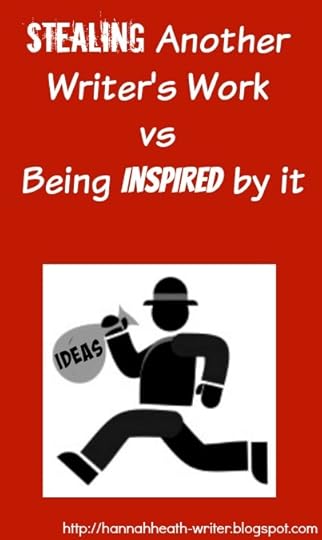 1. Remember that no idea is unique. Ever. It's impossible to have a completely original idea. Sometimes you may write something and realize that it's similar to something by another author. That's OK. Not to go all hippie on you, but all ideas and stories are connected in one giant circle, swirling round and round. You pick out one thread of an idea and you tug on them all. For example, C.S. Lewis, who is said to be a very original author, actually echoes the style of George MacDonald, who happened to be influenced by Novalis. This connection phenomenon is found in every writer because every writer has "stolen" concepts/characters/voices from those before them. Don't stress if your ideas are similar to others. People don't own ideas. They just shine a light on them.
1. Remember that no idea is unique. Ever. It's impossible to have a completely original idea. Sometimes you may write something and realize that it's similar to something by another author. That's OK. Not to go all hippie on you, but all ideas and stories are connected in one giant circle, swirling round and round. You pick out one thread of an idea and you tug on them all. For example, C.S. Lewis, who is said to be a very original author, actually echoes the style of George MacDonald, who happened to be influenced by Novalis. This connection phenomenon is found in every writer because every writer has "stolen" concepts/characters/voices from those before them. Don't stress if your ideas are similar to others. People don't own ideas. They just shine a light on them.
2. It's normal, even healthy, to shape yourself after writers that you admire. When you first start writing, you're going to need somebody to look up to and guide you. For me, I look to C.S. Lewis, J.K. Rowling, Lloyd Alexander, Douglas Adams, Lois Lowry, and many, many others. I study their style, their voice, and their ideas to help me find a way to better shape my own. That's not stealing. That's just a smart, respectful way of finding your own writing voice.
3. But don't go out of your way to copy other writers. You are trying to make your own style as a writer, not just copy the voices of the authors you admire. Nobody likes a copycat, and you can get in serious trouble for plagiarism.
4. Remember the writer's rule: Take what ye can. Give nothing back. Oh. Wait. That's a pirate guideline. But it works for writers, too. The world is made up of connecting ideas and inspiration. Take everything you can and run with it. As I mentioned above, because no idea is unique, original, or owned by others, it is not stealing to take an idea and rework it into your own. Don't let anyone tell you otherwise, and do NOT give up an idea because somebody tells you it's similar to another author's. However:
5. Don't try to lift insanely specific ideas or names from other writers. For instance, you can't have four kinds of wizards in your book: White, gray, brown, and blue. J.R.R. Tolkien crafted that and it's so specific to him that it's best to stay away. You can, however, use his idea of having different "orders" of wizards that can be told apart by specific characteristics or clothing. Naming your character Hermoine is a bad move because it's so unusual and so clearly connected to Rowling. But nobody will shoot you if you name one of your characters Fred.
6. Read widely. The more you read, the more comfortable you will be with drawing inspiration from other pieces of writing. Why? Because, as you read, you'll see such a wide variety of ideas that, once mashed together with your own, will form a completely unique story that is purely yours. It will also help you see that no story in the world has been written that is not reminiscent of another.
7. Give credit where credit is due. Don't try pretending like you don't owe some of your genius to other authors. Saying that you're inspired by other writers isn't admitting that you've stolen. It's also not saying that you're a cheap imitation. It's just showing people how you've learned your craft.
8. Don't use the same ideas that everyone else is. Want to know why there are so many cliche ideas and characters in books? Because writers don't follow point #6, or they latch onto one specific author. That's why we had a slew of dystopian, "teens pushed into combat" stories after the Hunger Games. Or why high fantasy has looked mostly the same since Tolkien took that genre by storm. If you're going to look to authors for inspiration, look to many different authors of many different genres and try not to follow a trend for the sake of the trend itself. OR you can try this one:
9. Use the same ideas that everyone else is, but do it better. Take an old, overdone idea and rework it. Get out there and show people how it's done. People don't tend to take this route very often because, honestly, you need a good amount of inspiration, talent, self-confidence, and probably a smidgen of arrogance to pull it off. But, when people do take this route and succeed, it can be pretty darn amazing.
10. Be you. Be inspired by others. Pay attention to what's happening around you and inside of you. Watch movies, read books, learn new things, talk to different people. Glean ideas from the world. But always, always add yourself to the mix. For example, my blog isn't particularly original. It's just writing tips. But it's also me: sarcasm and nerd references and to the point. I gather tips from what I see around me, but I also insert "essence of Hannah" into my posts because that's what makes them mine. Do the same for your writing. Find things that you feel strongly about, find a writing style you enjoy, a voice that is you and you'll be okay.
People have the idea that writers are creators. That's not true. We're discoverers. We uncover and tell the stories of age-old concepts. We're pushed to do so by the explorers that went before us. As such, there is nothing wrong or shameful in looking to past (or even present) writers for ideas and guidance.
So next time you have a good idea but then realize that it's already been done, don't freak out. Think back over these 10 points and then ask yourself: Can I run with this concept? The answer will probably be yes.
What about you? Have you ever discarded an idea because you thought it was stealing? What authors or books have shaped you as a writer?
Related articles:
6 Easy Ways to Gain Writing Inspiration
Challenging Creative Writers To Be More Creative
Challenging Writers to Create Stories With Meaning
Enjoy this post? Take a look around. If you like what you see, please don't forget to subscribe by email for a new post every week!
If I had a dollar for every time I've heard a creative writer utter that phrase (or something similar to it), I'd have enough money to buy that bookshelf I'm going to need pretty soon.
It always makes me cringe because it's just so darn wrong. There is a huge difference between stealing another writer's work and being inspired by it. Unfortunately, it seems that people can't distinguish between the two or, perhaps, are too afraid of plagiarism to try.
It is, however, a very legitimate fear because it can be hard to discern when you're stealing from other writers or just being guided by them. Here are 10 things to keep in mind to help you differentiate between the two:
 1. Remember that no idea is unique. Ever. It's impossible to have a completely original idea. Sometimes you may write something and realize that it's similar to something by another author. That's OK. Not to go all hippie on you, but all ideas and stories are connected in one giant circle, swirling round and round. You pick out one thread of an idea and you tug on them all. For example, C.S. Lewis, who is said to be a very original author, actually echoes the style of George MacDonald, who happened to be influenced by Novalis. This connection phenomenon is found in every writer because every writer has "stolen" concepts/characters/voices from those before them. Don't stress if your ideas are similar to others. People don't own ideas. They just shine a light on them.
1. Remember that no idea is unique. Ever. It's impossible to have a completely original idea. Sometimes you may write something and realize that it's similar to something by another author. That's OK. Not to go all hippie on you, but all ideas and stories are connected in one giant circle, swirling round and round. You pick out one thread of an idea and you tug on them all. For example, C.S. Lewis, who is said to be a very original author, actually echoes the style of George MacDonald, who happened to be influenced by Novalis. This connection phenomenon is found in every writer because every writer has "stolen" concepts/characters/voices from those before them. Don't stress if your ideas are similar to others. People don't own ideas. They just shine a light on them.2. It's normal, even healthy, to shape yourself after writers that you admire. When you first start writing, you're going to need somebody to look up to and guide you. For me, I look to C.S. Lewis, J.K. Rowling, Lloyd Alexander, Douglas Adams, Lois Lowry, and many, many others. I study their style, their voice, and their ideas to help me find a way to better shape my own. That's not stealing. That's just a smart, respectful way of finding your own writing voice.
3. But don't go out of your way to copy other writers. You are trying to make your own style as a writer, not just copy the voices of the authors you admire. Nobody likes a copycat, and you can get in serious trouble for plagiarism.
4. Remember the writer's rule: Take what ye can. Give nothing back. Oh. Wait. That's a pirate guideline. But it works for writers, too. The world is made up of connecting ideas and inspiration. Take everything you can and run with it. As I mentioned above, because no idea is unique, original, or owned by others, it is not stealing to take an idea and rework it into your own. Don't let anyone tell you otherwise, and do NOT give up an idea because somebody tells you it's similar to another author's. However:
5. Don't try to lift insanely specific ideas or names from other writers. For instance, you can't have four kinds of wizards in your book: White, gray, brown, and blue. J.R.R. Tolkien crafted that and it's so specific to him that it's best to stay away. You can, however, use his idea of having different "orders" of wizards that can be told apart by specific characteristics or clothing. Naming your character Hermoine is a bad move because it's so unusual and so clearly connected to Rowling. But nobody will shoot you if you name one of your characters Fred.
6. Read widely. The more you read, the more comfortable you will be with drawing inspiration from other pieces of writing. Why? Because, as you read, you'll see such a wide variety of ideas that, once mashed together with your own, will form a completely unique story that is purely yours. It will also help you see that no story in the world has been written that is not reminiscent of another.
7. Give credit where credit is due. Don't try pretending like you don't owe some of your genius to other authors. Saying that you're inspired by other writers isn't admitting that you've stolen. It's also not saying that you're a cheap imitation. It's just showing people how you've learned your craft.
8. Don't use the same ideas that everyone else is. Want to know why there are so many cliche ideas and characters in books? Because writers don't follow point #6, or they latch onto one specific author. That's why we had a slew of dystopian, "teens pushed into combat" stories after the Hunger Games. Or why high fantasy has looked mostly the same since Tolkien took that genre by storm. If you're going to look to authors for inspiration, look to many different authors of many different genres and try not to follow a trend for the sake of the trend itself. OR you can try this one:
9. Use the same ideas that everyone else is, but do it better. Take an old, overdone idea and rework it. Get out there and show people how it's done. People don't tend to take this route very often because, honestly, you need a good amount of inspiration, talent, self-confidence, and probably a smidgen of arrogance to pull it off. But, when people do take this route and succeed, it can be pretty darn amazing.
10. Be you. Be inspired by others. Pay attention to what's happening around you and inside of you. Watch movies, read books, learn new things, talk to different people. Glean ideas from the world. But always, always add yourself to the mix. For example, my blog isn't particularly original. It's just writing tips. But it's also me: sarcasm and nerd references and to the point. I gather tips from what I see around me, but I also insert "essence of Hannah" into my posts because that's what makes them mine. Do the same for your writing. Find things that you feel strongly about, find a writing style you enjoy, a voice that is you and you'll be okay.
People have the idea that writers are creators. That's not true. We're discoverers. We uncover and tell the stories of age-old concepts. We're pushed to do so by the explorers that went before us. As such, there is nothing wrong or shameful in looking to past (or even present) writers for ideas and guidance.
So next time you have a good idea but then realize that it's already been done, don't freak out. Think back over these 10 points and then ask yourself: Can I run with this concept? The answer will probably be yes.
What about you? Have you ever discarded an idea because you thought it was stealing? What authors or books have shaped you as a writer?
Related articles:
6 Easy Ways to Gain Writing Inspiration
Challenging Creative Writers To Be More Creative
Challenging Writers to Create Stories With Meaning
Enjoy this post? Take a look around. If you like what you see, please don't forget to subscribe by email for a new post every week!

Published on November 20, 2015 08:38
November 16, 2015
Skies of Dripping Gold: Cover Reveal
A few months ago I embarked on the journey of self-publication. It started with a story idea, which then grew into a short story titled Skies of Dripping Gold. The actual writing of this story went very smoothly, which was a huge surprise, because it usually takes me a while to get the words sitting just right on the page.
Next, I had to edit the story. Grueling, but it went very well. From there I wrote a synopsis, launched into formatting the story for both Kindle and Createspace, wrote an "about the author," and tried to figure out how many of my amazing writer friends I could squeeze into the acknowledgments page.
Finally I had everything finished. Skies of Dripping Gold was complete. There was just one problem:
I had no cover. On top of that, I had an even larger problem:
On top of that, I had an even larger problem:
I have absolutely no drawing skills.
How was I supposed to make a cover if I don't know how to draw?
When I sat down to try and find a way around this problem, I came to the conclusion that I can draw. My drawing is just limited to circles, rectangles, squares, and lines. And stick figures. But somehow I thought stick figures would be frowned upon by the indie community, so I decided to try and make a cover using only basic shapes and lines. I believe this is called minimalist art, but, if we're going to be truthful, it probably should be called "art for people like Hannah who can't pull off complex sketches."
So, after re-reading my story and browsing Pinterest for examples of minimalist drawings, I came up with a cover. I'm very happy with it, especially because I didn't have to resort to stick figures: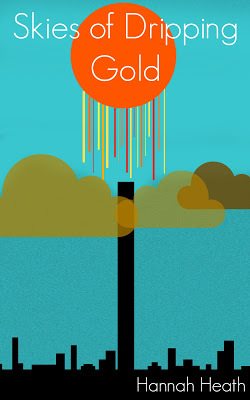 What do you think of it? Please spread it around and help share the news. Remember, December 5th is the release date. If you haven't gotten the chance to read the synopsis yet, click here to learn about the story-line for Skies of Dripping Gold. I'd love to hear your thoughts!
What do you think of it? Please spread it around and help share the news. Remember, December 5th is the release date. If you haven't gotten the chance to read the synopsis yet, click here to learn about the story-line for Skies of Dripping Gold. I'd love to hear your thoughts!
Related articles:
Skies of Dripping Gold: Synopsis and Release Date
6 Reasons You Should Be Writing Short Stories....And 5 Tips to Help You Get Started
Help Me Choose The Best Logline
Enjoy this post? Take a look around. If you like what you see, please don't forget to subscribe by email for a new post every Friday!
Next, I had to edit the story. Grueling, but it went very well. From there I wrote a synopsis, launched into formatting the story for both Kindle and Createspace, wrote an "about the author," and tried to figure out how many of my amazing writer friends I could squeeze into the acknowledgments page.
Finally I had everything finished. Skies of Dripping Gold was complete. There was just one problem:
I had no cover.
 On top of that, I had an even larger problem:
On top of that, I had an even larger problem: I have absolutely no drawing skills.
How was I supposed to make a cover if I don't know how to draw?
When I sat down to try and find a way around this problem, I came to the conclusion that I can draw. My drawing is just limited to circles, rectangles, squares, and lines. And stick figures. But somehow I thought stick figures would be frowned upon by the indie community, so I decided to try and make a cover using only basic shapes and lines. I believe this is called minimalist art, but, if we're going to be truthful, it probably should be called "art for people like Hannah who can't pull off complex sketches."
So, after re-reading my story and browsing Pinterest for examples of minimalist drawings, I came up with a cover. I'm very happy with it, especially because I didn't have to resort to stick figures:
 What do you think of it? Please spread it around and help share the news. Remember, December 5th is the release date. If you haven't gotten the chance to read the synopsis yet, click here to learn about the story-line for Skies of Dripping Gold. I'd love to hear your thoughts!
What do you think of it? Please spread it around and help share the news. Remember, December 5th is the release date. If you haven't gotten the chance to read the synopsis yet, click here to learn about the story-line for Skies of Dripping Gold. I'd love to hear your thoughts!Related articles:
Skies of Dripping Gold: Synopsis and Release Date
6 Reasons You Should Be Writing Short Stories....And 5 Tips to Help You Get Started
Help Me Choose The Best Logline
Enjoy this post? Take a look around. If you like what you see, please don't forget to subscribe by email for a new post every Friday!

Published on November 16, 2015 08:37
November 13, 2015
12 Ridiculous Questions Non-Writers Ask Writers (And 12 Ways To Respond to Them)
Writers are put in a unique position because our profession is considered both a job and a hobby. The writer's life is also very private, since most of our work involves sitting behind a computer screen. This results in "regular" people having no idea what a writer's life entails.
And, unfortunately, this ignorance leads to non-writers making really, really insane comments about writing. Below are 12 of my favorites, along with some recommended (and not recommended) come-backs.
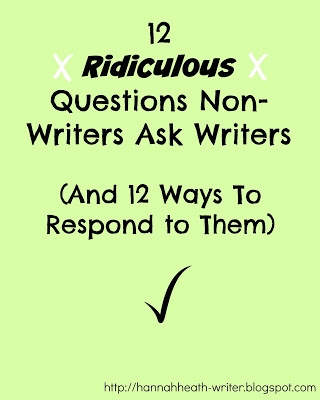 1. Non-Writer: "So, you still writing?"
1. Non-Writer: "So, you still writing?"
How writers want to respond: "Am I still breathing? Yeah? Then yes, of course I'm still writing." How writers should respond: "Yup."2. Non-Writer: "Yeah, I have this book idea I've always wanted to try, but I just don't have time to write it. Say, we should collaborate on the idea and split the money."
How writers want to respond: "Okay, so many things wrong with that statement. First off, what do you mean you don't have time to write? You find time. You make time. Just like any other job. And no, I don't want to collaborate. I already have 8 other book ideas lined up and our 'collaboration' would last about three weeks and then explode when you try to put a love triangle into the story." How writers should respond: "I'm pretty busy right now, but maybe some other time." 3. Non-Writer: "Oh, you're a writer? So how much money do you make doing that?" Or, slightly less subtly, "A writer? You know you can't make money doing that." How writers want to respond: "Gah. This question AGAIN? Stop rubbing it in!"How writers should respond: "Ha, yeah. I hardly make any money. I'm going to have to go live in a gutter in a few months. Wanna lend me some dough?" Then step back and watch the other person look for the closest exit. 4. Non-Writer: "So, when are you going to publish that book of yours?" How writers want to respond: Throttle the other person while screaming: "It doesn't work like that!"How writers should respond: "Oh, who knows? Hopefully in a year or so. There are a lot of complicated steps that have to take place first." 5. Non-Writer: "Oh my gosh, you finally published that book! Can I have a free copy?" How writers want to respond: "I worked my tail off to publish that book. It represents years of hard work. If you can't dig up enough money to honor that, then you'll just have to lump it. Because no, I will not be giving away my hard work and passion for free." How writers should respond: "I worked my tail off to publish that book. It represents years of hard work. If you can't dig up enough money to honor that, then you'll just have to lump it. Because no, I will not be giving away my hard work and passion for free." 6. Non-Writer: "So, like, you're going to be the next Suzanne Collins?" How writers want to respond: "Suzanne Collins? Pfft. No. I'm going to be totally unique. Ain't no think like me 'cept me." How writers should respond: "Ha. No. I'm going to be the first [insert your name here]." 7. Non-Writers: "You write fantasy? Why don't you write some real?" How writers want to respond: *mumble profanities under breath* "Fantasy is real. You'd know that if you actually took the time to read and think about it. It reflects the world around us in a way that makes it understandable to us."How writers should respond: "Fantasy is real. It reflects the world around us in a way that makes it understandable to us." Proceed to recommend them a fantasy novel that you think will help them understand this concept. 8. Non-Writers: "Whaddya mean you're busy? You don't even do anything all day." How writers want to respond: "Don't do anything all day? Don't do ANYTHING all day? Let me explain something to you..." *Launches into long explanation about writer's platforms, social media, writing schedules, editing, outlining, and character development* How writers should respond: "Actually, I get a lot of ideas from watching Netflix all day, so that doesn't count as not doing anything." 9. Non-Writers: After reading your story: "So which character is you?"How writers want to respond: "No. Just. Just no. That's not how this works. That's not how ANY of this works." How writers should respond. "All of them and none of them. That's about as accurate of an explanation as I can give you that you'll actually understand. Sorry." 10. Non-Writers: After reading your story: "So which character is me?"How writers want to respond: *points at character that dies a horrible death* "That one." How writers should respond: "Oh, none of them. I try not to write characters after people I know. My readers wouldn't be able to handle that much awesomeness." 11. Non-Writers: "Writers are really weird. You know most of them go crazy. You gotta be careful or you might turn out like that, too." How writers want to respond: "Exactly where are you getting this information? Also, weird is pretty subjective, so your idea of weird is probably my idea of awesome."How writers should respond: "Too late to be careful. Nothing can save me now." 12. Non-Writer: After listening to your story idea: "You know, that's actually pretty stupid." How writers want to respond: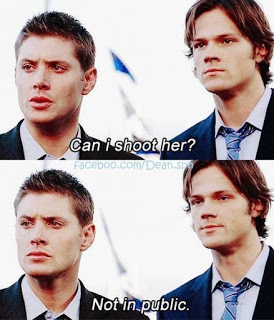 How writers should respond: *realizes the non-writer is actually right* "Oh. Wow. This is awkward." And there you have it. 12 of the most ridiculous questions we writers get. If you have any to add, leave a comment below.
How writers should respond: *realizes the non-writer is actually right* "Oh. Wow. This is awkward." And there you have it. 12 of the most ridiculous questions we writers get. If you have any to add, leave a comment below.
Related articles: 10 Things Nobody Tells You About Being A Writer Until It's Too Late
Enjoy this post? Take a look around. If you like what you see, please don't forget to subscribe by email for a new post every Friday!

And, unfortunately, this ignorance leads to non-writers making really, really insane comments about writing. Below are 12 of my favorites, along with some recommended (and not recommended) come-backs.
 1. Non-Writer: "So, you still writing?"
1. Non-Writer: "So, you still writing?"How writers want to respond: "Am I still breathing? Yeah? Then yes, of course I'm still writing." How writers should respond: "Yup."2. Non-Writer: "Yeah, I have this book idea I've always wanted to try, but I just don't have time to write it. Say, we should collaborate on the idea and split the money."
How writers want to respond: "Okay, so many things wrong with that statement. First off, what do you mean you don't have time to write? You find time. You make time. Just like any other job. And no, I don't want to collaborate. I already have 8 other book ideas lined up and our 'collaboration' would last about three weeks and then explode when you try to put a love triangle into the story." How writers should respond: "I'm pretty busy right now, but maybe some other time." 3. Non-Writer: "Oh, you're a writer? So how much money do you make doing that?" Or, slightly less subtly, "A writer? You know you can't make money doing that." How writers want to respond: "Gah. This question AGAIN? Stop rubbing it in!"How writers should respond: "Ha, yeah. I hardly make any money. I'm going to have to go live in a gutter in a few months. Wanna lend me some dough?" Then step back and watch the other person look for the closest exit. 4. Non-Writer: "So, when are you going to publish that book of yours?" How writers want to respond: Throttle the other person while screaming: "It doesn't work like that!"How writers should respond: "Oh, who knows? Hopefully in a year or so. There are a lot of complicated steps that have to take place first." 5. Non-Writer: "Oh my gosh, you finally published that book! Can I have a free copy?" How writers want to respond: "I worked my tail off to publish that book. It represents years of hard work. If you can't dig up enough money to honor that, then you'll just have to lump it. Because no, I will not be giving away my hard work and passion for free." How writers should respond: "I worked my tail off to publish that book. It represents years of hard work. If you can't dig up enough money to honor that, then you'll just have to lump it. Because no, I will not be giving away my hard work and passion for free." 6. Non-Writer: "So, like, you're going to be the next Suzanne Collins?" How writers want to respond: "Suzanne Collins? Pfft. No. I'm going to be totally unique. Ain't no think like me 'cept me." How writers should respond: "Ha. No. I'm going to be the first [insert your name here]." 7. Non-Writers: "You write fantasy? Why don't you write some real?" How writers want to respond: *mumble profanities under breath* "Fantasy is real. You'd know that if you actually took the time to read and think about it. It reflects the world around us in a way that makes it understandable to us."How writers should respond: "Fantasy is real. It reflects the world around us in a way that makes it understandable to us." Proceed to recommend them a fantasy novel that you think will help them understand this concept. 8. Non-Writers: "Whaddya mean you're busy? You don't even do anything all day." How writers want to respond: "Don't do anything all day? Don't do ANYTHING all day? Let me explain something to you..." *Launches into long explanation about writer's platforms, social media, writing schedules, editing, outlining, and character development* How writers should respond: "Actually, I get a lot of ideas from watching Netflix all day, so that doesn't count as not doing anything." 9. Non-Writers: After reading your story: "So which character is you?"How writers want to respond: "No. Just. Just no. That's not how this works. That's not how ANY of this works." How writers should respond. "All of them and none of them. That's about as accurate of an explanation as I can give you that you'll actually understand. Sorry." 10. Non-Writers: After reading your story: "So which character is me?"How writers want to respond: *points at character that dies a horrible death* "That one." How writers should respond: "Oh, none of them. I try not to write characters after people I know. My readers wouldn't be able to handle that much awesomeness." 11. Non-Writers: "Writers are really weird. You know most of them go crazy. You gotta be careful or you might turn out like that, too." How writers want to respond: "Exactly where are you getting this information? Also, weird is pretty subjective, so your idea of weird is probably my idea of awesome."How writers should respond: "Too late to be careful. Nothing can save me now." 12. Non-Writer: After listening to your story idea: "You know, that's actually pretty stupid." How writers want to respond:
 How writers should respond: *realizes the non-writer is actually right* "Oh. Wow. This is awkward." And there you have it. 12 of the most ridiculous questions we writers get. If you have any to add, leave a comment below.
How writers should respond: *realizes the non-writer is actually right* "Oh. Wow. This is awkward." And there you have it. 12 of the most ridiculous questions we writers get. If you have any to add, leave a comment below. Related articles: 10 Things Nobody Tells You About Being A Writer Until It's Too Late
Enjoy this post? Take a look around. If you like what you see, please don't forget to subscribe by email for a new post every Friday!

Published on November 13, 2015 08:46



